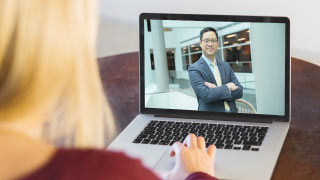Preparation Tips For A Realtime Deposition
August 30, 2018
Court Reporting
Real Time Deposition Preparation Tips & How Realtime Depositions Work
What is a realtime deposition?
Realtime court reporting is the live translation of a reporter’s stenotype writing into readable text. This service allows attorneys or other participants to connect to the realtime reporters’ computer and view the draft testimony on a laptop or tablet as it occurs. It has proved to be a valuable tool for complex litigation cases, arbitrations or trials.
How does a realtime deposition work?
As testimony proceeds, the court reporter writes the testimony on their stenograph machine. A custom dictionary the reporter has prepared translates the steno back into written English language and displays it onto their computer. The written language is then wirelessly transmitted to the attorney’s iPad or computer for viewing.
To conduct a smooth and problem-free realtime deposition with an easy-to-read transcript, follow these preparation tips:
Before a realtime deposition
Schedule the realtime deposition with a qualified realtime court reporter.
It takes a special court reporter to take a realtime deposition. Lexitas maintains a core group of experienced independent court reporters who are qualified to perform realtime reporting.
Provide as much background information to Lexitas as possible, including:
- Terminology to be used and discussed – Ensures that technical terms, medical terms, acronyms and expert witness language, etc. will appear in the realtime feed accurately.
- Suggested documents to provide to Lexitas would be pleadings, interrogatories, previously taken depositions in the case
- Planned attendees – Ensures that all parties’ names appear correctly when referred to in the record.
- Attendees using the realtime feed – this information is needed to ensure that the court reporter provides viewing equipment for all realtime viewing attendees
During a real-time deposition
Ensure that participants speak one at a time and at a controlled speed.
On the day of the deposition, it is important for everyone to speak clearly and one at a time. This allows the witness to fully answer the questions and also allows other attorneys to object before proceeding. Speaking too quickly will also make it difficult for the court reporter to create a readable live transcript.
Not a Final Transcript
The realtime translation is not the final transcript. You will see words that did not translate or words that translated incorrectly. Do not panic. Your reporter knows this and has marked this testimony on their end and will take care of it during the edit process. It is a multi-phase process to ensure a certified transcript. Realtime is a helpful tool provided to attorneys and it is a rough draft of the reporter’s work product.
Pause at the end of a sentence (or other breaks)
It’s up to the attorney asking the questions to keep the questions and answers flowing at an even, controlled pace so that the court reporter can record the transcript as smoothly and accurately as possible. It is recommended to consciously pause before asking the next question and to breathe at periods.
Remember that it’s a team effort
The best results occur when the attorneys and the court reporter work together. Taking breaks every hour is helpful and allows the reporter to make dictionary defines and get clarification of testimony if needed. Plus a little stretch, water and snacks can go a long way to ensure clear thinking for all.
After a realtime deposition
If requested, the court reporter may be able to arrange the delivery of a rough draft or an expedited transcript of the deposition.
The court reporter always strives to ensure that your deposition goes smoothly and professionally. Feel free to ask your court reporter any questions you may have.
Related Resources

Articles
Court Reporting
5 Things to Expect from Your Court Reporting Firm
Here are five things to expect from your court reporting firm to have your case go smoothly.
Read More
Articles
Remote Proceedings
How to Achieve Dramatic Results with Remote Video Depositions
Now with advancements in remote video technology attorneys are increasingly opting to conduct remote depositions for several reasons.
Read More
Case Studies
Record Retrieval
Custom Medical Record Retrieval Solution Saves Firm $250,000
Lexitas designed a custom solution to speed medical record retrieval and data entry, saving the firm over $250,000.
Read More